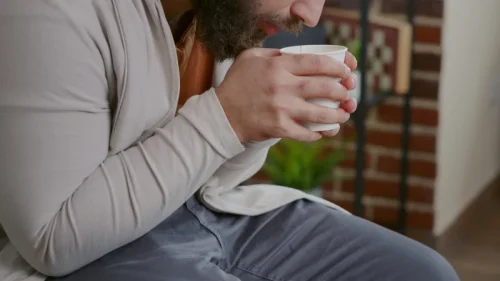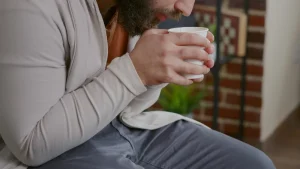
As Dr. Greenfield puts it, “Time is on your side.” Just breathe, take care of yourself, and remember that hangxiety isn’t forever. Even if you’re consuming a standard amount of alcohol — a 12-ounce beer or a 5-ounce glass of wine — you’ll experience a mild detox or withdrawal. It takes your body and liver about eight hours to remove what’s essentially a poison.
- And, if you really can’t cut down, then it’s best to seek advice from your Doctor about alcohol dependency.
- Alcohol is a natural disinhibitor — meaning it can cause you to make choices you may not make while sober.
- Through yoga/meditation the mind is diverted towards something more productive and calm, allowing the person to escape the negative, distress causing thoughts.
- There also seems to be a correlation between the amount of alcohol I drink and how anxious I am—the more gin and tonics I have, the more anxious I’ll be when they wear off.
- However, this is something that you should first discuss with your doctor before you decide to do so to ensure that it is safe and effective.
- The tourists — who included four Australians and an American — were stricken on Saturday after drinking pina coladas at the five-star Warwick Fiji resort, government officials have said.
Here’s Why You Could Experience Alcohol Anxiety ‘The Next Day’
While some people may believe that wine and beer may cause less anxiety than hard liquor due to its alcohol content, this is not true. It’s not necessarily the type of alcohol you drink that can affect your levels of anxiety, but rather anxiety is related to the amount and frequency of alcohol use. This pervasive anxiety can also manifest in physical symptoms such as sweating, fear of alcohol panic attacks, and a deep sense of helplessness, creating a cycle of fear that reinforces their avoidance behaviours. The irrational fear or phobia towards consuming alcohol is called dipsophobia.

Get advice that’s rooted in medical expertise:
Treatment options include therapies like CBT and exposure therapy, along with medication https://ecosoberhouse.com/ in some cases, to help individuals overcome their fear and improve their quality of life. You can check out detailed infomation about 500+ phobia on Drlogy Phobia dedicated page for A-Z information. When seeking help for Methyphobia, it is recommended to consult with a Phobia Consultant who specializes in anxiety disorders. Their expertise can provide effective treatment and support in overcoming Methyphobia or overcoming fear. Alcohol’s effects on your brain, classic hangover factors like dehydration, and worry about the night’s events can all increase anxiety after drinking. Persistent anxiety could be the sign of an anxiety disorder, or regular hangover anxiety could hint at excessive drinking habits or alcohol use disorder.
Ready to Overcome Fear of Alcohol?
- Seeking professional treatment for an alcohol use disorder and anxiety can help you regain control of your life.
- Another form of therapy, exposure therapy, is often beneficial for treating phobias as well.
- Relaxation techniques and physical exercise can help to manage anxiety and also serve as tools for minimizing relapse.
- Alcohol related anxiety – or hangxiety if you will – is incredibly common – you’re not alone and there are things you can to do help.
- Those affected may grapple with intense worry about losing control or facing judgement from others, which can lead to the avoidance of social gatherings or celebrations that may involve alcohol.
They then identify the real cause of the particular fear/phobia the patient has. The trauma and pain the suffering experienced can be the cause of why he fears alcohol. Also, may be because of an alcoholic parent, one suffered financial losses. One might have more severe symptoms than the other, based on their past experiences and intensity of the phobia.
What Happens When You Drink
- Aside from alcoholism, other reasons people may not drink include medical conditions, pregnancy, religion, culture, or just personal preference.
- The causes of Methyphobia, the fear of alcohol, can vary from person to person.
- That’s because it’s mostly the hangover the next day, while your body is trying to get rid of the toxin that causes alcohol anxiety.
- Traumatic experiences related to alcohol, such as witnessing violent behavior or experiencing alcohol poisoning, can also contribute to the development of this phobia.
Be that as it may, it is imperative that the therapist implementing it on their patient is very adept at doing so. Someone who suffers from a phobia may turn to alcohol as a coping mechanism, as a way to self-medicate the difficult symptoms of anxiety. Alcohol is a central nervous system depressant, which means that it slows down the “fight-or-flight” stress reaction that is often heightened in someone who struggles with intense anxiety.
- As this is happening, it can affect your central nervous system and cause you to feel jittery or anxious.
- Do you ever notice yourself feeling a little out of sorts the day after you drink?
- When a person feels fear, things like heart rate, respiration level, body temperature, blood pressure, focus, attention, and energy levels are all heightened.
What Can Cause Methyphobia?

The exact prevalence of Methyphobia, the fear of alcohol, is difficult to determine as it is not extensively studied. However, specific phobias, including phobias related to substances, are relatively common. It is estimated that around 12.5% of what is alcoholism individuals may experience a specific phobia at some point in their lives.

How to Manage Anxiety Symptoms After Quitting Drinking Alcohol
CBT is also helpful for the treatment of substance abuse and addiction, and it can help individuals learn tools to manage stress and work through difficult emotions without needing to use alcohol to self-medicate. Alcohol abuse can also lead to more problems, including financial strain, health issues, interpersonal relationship troubles, and difficulties fulfilling life obligations, potentially causing unemployment and homelessness. Continued alcohol abuse can also lead to addiction and increased emotional strain.

